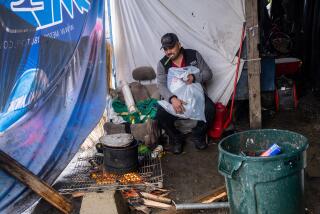Wage Supplements Key to Milwaukee Program
- Share via
MILWAUKEE — Despite Milwaukee’s slight economic upswing in the late 1980s, its inner city still wallows in poverty. With minimum-wage jobs paying less than welfare and few sources of child care for working parents, there are few incentives to get a job.
Government officials face the same dilemma in Central Los Angeles, where 1990 U.S. Census data show that in some areas more than half the residents are on some form of government assistance.
In Milwaukee, Congress for a Working America, a local nonprofit group, tackled the problem by starting the New Hope Project to help the working poor and those on government assistance by guaranteeing health insurance, child care and wage supplements.
Unlike current welfare reform efforts, the New Hope Project requires that participants work a minimum of 30 hours a week. The project does not find jobs for participants or pay for job training.
“Part of our point is to get at the root causes of poverty more directly for the working poor and creating an incentive for people on assistance not to go back on (Aid to Families With Dependent Children),” said Julie Kersick, associate director of New Hope.
The monthly wage supplements range from $56 to $256 a month, depending on salary. The objective is to give families enough money to supplement their salaries so that they will not have to rely on government assistance and can move permanently into the labor force, Kersick said. The program attempts to bring a family’s income to about 170% over the federal poverty level, which is $21,400 a year for a family of three, she said.
This month, California’s Department of Social Services is instituting welfare reforms that provide money for child care and reward parents who work by providing monthly supplements of up to $372 that would not be reduced if parents work full-time jobs. There is no maximum wage for the participants, all of whom must be on government assistance to be eligible. The amount of the supplements families receive depends on their income and total expenses, state social services officials said.
New Hope, which has operated on a trial basis since October, works with 50 families on a $5-million budget raised through private donations and local and state funding. Program organizers hope to enroll as many as 600 families during the next three years with a $20-million budget funded through private companies and local, state and federal agencies.
“This is a real innovative program that is being closely watched around the country,” said Michael Wiseman, an urban specialist at the University of Wisconsin. “If it’s successful, it could possibly take the place of welfare reform, which has shown that it’s inadequate.”
Donald Sykes, executive director of New Hope, said officials are hoping the project’s success will allow them to influence federal welfare reform policy.
“We are running a demonstration that we want to prove to the government is a more effective . . . way of dealing with the welfare recipients and working poor in the country,” Sykes said.
More to Read
Sign up for Essential California
The most important California stories and recommendations in your inbox every morning.
You may occasionally receive promotional content from the Los Angeles Times.













